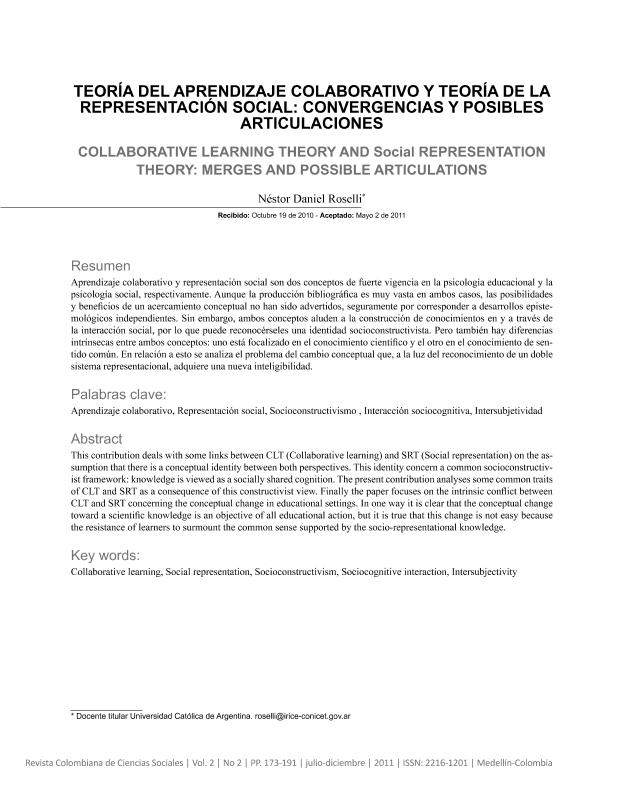Mostrar el registro sencillo del ítem
dc.contributor.author
Roselli, Nestor Daniel

dc.date.available
2017-03-28T15:47:00Z
dc.date.issued
2011-07
dc.identifier.citation
Roselli, Nestor Daniel; Teoría del aprendizaje colaborativo y Teoría de la representación social: convergencias y posibles articulaciones ; Fundación Universitaria Luis Amigó; Revista Colombiana de Ciencias Sociales; 2; 2; 7-2011; 173-191
dc.identifier.issn
2216-1201
dc.identifier.uri
http://hdl.handle.net/11336/14394
dc.description.abstract
Aprendizaje colaborativo y representación social son dos conceptos de fuerte vigencia en la psicología educacional y la psicología social, respectivamente. Aunque la producción bibliográfica es muy vasta en ambos casos, las posibilidades y beneficios de un acercamiento conceptual no han sido advertidos, seguramente por corresponder a desarrollos epistemológicos independientes. Sin embargo, ambos conceptos aluden a la construcción de conocimientos en y a través de la interacción social, por lo que puede reconocérseles una identidad socioconstructivista. Pero también hay diferencias intrínsecas entre ambos conceptos: uno está focalizado en el conocimiento científico y el otro en el conocimiento de sentido común. En relación a esto se analiza el problema del cambio conceptual que, a la luz del reconocimiento de un doble sistema representacional, adquiere una nueva inteligibilidad.
dc.description.abstract
This contribution deals with some links between CLT (Collaborative learning) and SRT (Social representation) on the assumption that there is a conceptual identity between both perspectives. This identity concern a common socioconstructivist framework: knowledge is viewed as a socially shared cognition. The present contribution analyses some common traits of CLT and SRT as a consequence of this constructivist view. Finally the paper focuses on the intrinsic conflict between CLT and SRT concerning the conceptual change in educational settings. In one way it is clear that the conceptual change toward a scientific knowledge is an objective of all educational action, but it is true that this change is not easy because the resistance of learners to surmount the common sense supported by the socio-representational knowledge.
dc.format
application/pdf
dc.language.iso
spa
dc.publisher
Fundación Universitaria Luis Amigó
dc.rights
info:eu-repo/semantics/openAccess
dc.rights.uri
https://creativecommons.org/licenses/by-nc-sa/2.5/ar/
dc.subject
Aprendizaje Colaborativo
dc.subject
Representación Social
dc.subject
Socioconstructivismo
dc.subject
Intersubjetividad
dc.subject.classification
Psicología

dc.subject.classification
Psicología

dc.subject.classification
CIENCIAS SOCIALES

dc.title
Teoría del aprendizaje colaborativo y Teoría de la representación social: convergencias y posibles articulaciones
dc.title
Collaborative learning theory and Social representation theory: merges and possible articulations
dc.type
info:eu-repo/semantics/article
dc.type
info:ar-repo/semantics/artículo
dc.type
info:eu-repo/semantics/publishedVersion
dc.date.updated
2017-03-16T14:31:04Z
dc.journal.volume
2
dc.journal.number
2
dc.journal.pagination
173-191
dc.journal.pais
Colombia

dc.journal.ciudad
Medellín
dc.description.fil
Fil: Roselli, Nestor Daniel. Consejo Nacional de Investigaciones Científicas y Técnicas. Centro Científico Tecnológico Rosario. Instituto Rosario de Investigaciones en Ciencias de la Educación; Argentina. Pontificia Universidad Católica Argentina "Santa María de Los Buenos Aires"; Argentina
dc.journal.title
Revista Colombiana de Ciencias Sociales
dc.relation.alternativeid
info:eu-repo/semantics/altIdentifier/url/http://www.funlam.edu.co/revistas/index.php/RCCS/article/view/238
dc.relation.alternativeid
info:eu-repo/semantics/altIdentifier/url/https://dialnet.unirioja.es/servlet/articulo?codigo=5123804
Archivos asociados
